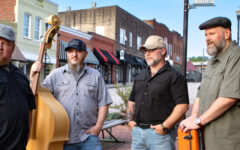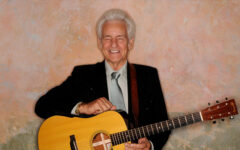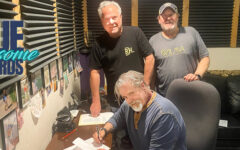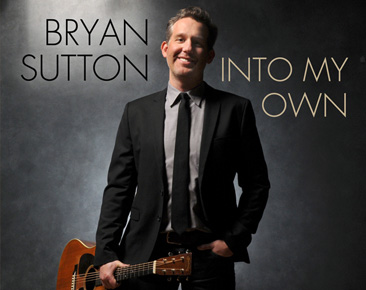
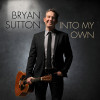 For a great many years, Bryan Sutton has flown under a lot of people’s radar. Those ‘in the know,’ or closely connected to the acoustic music world, recognized the fiery flatpicker as the first guitar gunslinger with Ricky Skaggs & Kentucky Thunder in the late ’90s, a prestigious studio musician, or the fourth member of Hot Rize for their recurring reunions.
For a great many years, Bryan Sutton has flown under a lot of people’s radar. Those ‘in the know,’ or closely connected to the acoustic music world, recognized the fiery flatpicker as the first guitar gunslinger with Ricky Skaggs & Kentucky Thunder in the late ’90s, a prestigious studio musician, or the fourth member of Hot Rize for their recurring reunions.
Since leaving Skaggs, Bryan had contented himself with studio work and free lance touring, which kept him busy, but over the past few years the notion of doing more with his music began to percolate up in his mind. As such thoughts became serious, he knew what it would take – he would have to start singing as well as playing guitar.
On his latest Sugar Hill project, Into My Own, Sutton launches his career as a vocalist. Five of the album’s 12 tracks feature him as lead singer, something Bryan says he’s been doing off and on since he was a child.
“I’ve toyed around with it all my life. I sang with my family band as a teenager and I have been singing with Tim O’Brien the past decade – doing it more and more.
I didn’t want to look back ten years from now and wish I had done it. I really love being the guitar player, but I love singing with a band. It’s a bit intimidating given all the greats, but I’m just looking to be the best me I can be. Just have fun and not worry about what anyone else had done.
I love singing, I’m getting better, and I’ll keep getting better at it.”
And it turns out he’s quite good at it. Two, Guy Clark’s mournful 3/4 time ballad Anyhow I Love You, and the grassy chestnut Swannanoa Tunnel, were recorded with The Travelin’ McCourys with whom Bryan performs on occasion. Another two are performed solo with Sutton accompanying himself – on banjo for his own composition, Run Away, and on guitar for a rendition of Been All Around This World.
“I wrote Run Away as soon as I got that new banjo, and had it finished within ten minutes. It’s like the song came with the banjo. It was so strange… I actually put it off recording it, unsure that it was a good one based on how quickly it came. I had to play it for a few other musicians before I was convinced to cut it.
I found this other set of words for Been All Around This World and used a 1942 O-17 that my grandfather bought in San Francisco new when he was in the Navy. He was a chief on a sub hunter and took me to the Opry for the first time when I was a kid.”
Of course, there’s plenty of hot picking to be had as well. The album opens with a tasty version of Cricket On The Hearth played with a bit of pep by Bryan with Noam Pikelny on banjo, Sam Bush on mandolin, Stuart Duncan on fiddle and Greg Garrison on bass. That same quartet supports Sutton’s guitar on four other tracks as well.
They really shine on Ole Blake, a guitar tune Bryan wrote in honor of one of his guitar heroes, Norman Blake. In fact, you can sense the Blake influence throughout the record, whether the music has an old time feel, or a adventurous modern grass vibe.
And Sutton says that isn’t by accident.
“I never had much discipline as a kid, to study note-for-note. Norman has always had such a pocket and a freedom in what he plays. You can get too much into the finesse or perfection in your playing. That old time vibe from Blake is so free in his playing. I try to infuse that in all I do.”
Two other standouts that lean towards the modern side are Overton Waltz, a beautiful melody well-served by Bush, Pikelny, Garrison and Duncan, and Log Jam, more of a free-for-all improvisational piece. Both are Sutton originals, the first of which he says he plays in a finger style.
“It’s the hybrid thing where I use the flat pick and two fingers, a la Jerry Reed or Albert Lee. I don’t do it a lot in my bluegrass playing.
For Logjam, there’s the main hook/grove I’m playing, and the part that Sam and Stuart play, but it’s mostly a blues jam. I turned it around into 6/4, so the timing has a little twist, a fairly common jazz technique. It’s one of those songs that just sort of happened – looking for songs I could play live, more so than some of my earlier records. It could go on and on.”
Another interesting number is Frissel’s Rag, written as a tribute for the jazz guitarist, Bill Frissel. Bryan said he wrote it some years ago, and explained how he managed to get Bill to cut it with him.
“I wrote this song when I first heard Bill, right after I had first moved to Nashville. I loved the way he painted sounds – made songs and notes rub up on each other. Greg Garrison later invited me out to Denver to do some shows, and Bill was on them. We did some old time tunes and some of his. Bill’s a huge fan of traditional American music. Meeting him and getting along with him is what led me to cut this one.”
On the subject of songwriting…
“Writing is something that develops… like a thought you tune in on, if you’re open to it. Same as instrumental writing – you tap into that source and let it happen.
Evolving as a writer, you’re always looking for that elusive ability to create songs that are memorable, that stick with people. A melody that’s memorable but new. Trying to stay one step ahead of the listener. I feel like I’m getting closer to being able to do that.”
One last point about this unique musical artist. I noticed that in the liner notes that a special thanks is offered to Harry Connick, Jr – the superstar singer, arranger, actor, and television personality – and I had to ask how they knew each other.
“I worked on his last two records and we struck up a friendship a few years ago. He’s a real open guy – an honest guy who says what he feels. He’s been very supportive of me. we got to hang out when he was in Nashville a year or so ago. Interesting to get to know someone like him.
Met through Lee Ann Womack who recommended me when he was looking for an acoustic guitarist and we hit it off in the studio. He called again when he started working on his latest record.
It’s inspiring when you get affirmation from someone you respect.”
How much fun would it be to live as Bryan Sutton for a few days?
Into My Own is a powerful statement about musical evolution, virtuosity, and just really good playing and singing. Grab you a copy soon.

